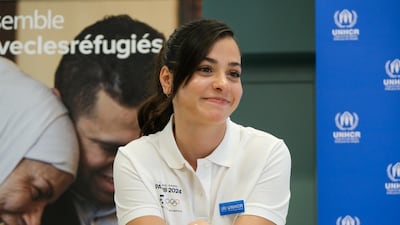Syria's most famous swimmer, Yusra Mardini, has spent the past weeks in Paris, embedded in the refugee Olympic team for the third summer Games in a row.
But Mardini, 26, has shifted from being the main focus of the Olympics story – an athlete – to storyteller, after landing a contract with Eurosport to cover refugee Olympians, before she returns to her film studies at the University of Southern California.
It is an emotional moment for Mardini, who continues to promote refugee rights as a UNHCR goodwill ambassador one year after her retirement from swimming.
Her painful journey fleeing the Syrian war with her sister across the Mediterranean Sea to Germany, swimming for hours beside an overloaded dinghy, was turned into the acclaimed 2022 Netflix drama The Swimmers.
Speaking to The National from a centre dedicated to supporting refugees in the north-east of Paris, Mardini said that the shift away from professional swimming has been “bittersweet” but that she has found her calling.
“I always say I'm a storyteller and I want to tell the story of other refugees and not just mine. Do I miss swimming? Absolutely. Are people convinced I left swimming? Nope,” she said.

Refugee team wins first medal
“There's no way to convince the fans I don't swim any more because of The Swimmers. It's a bittersweet feeling because I really want to swim, but I'll always be a swimmer.”
The refugee team scored a historic win on Thursday when boxer Cindy Ngamba from Cameroon won their first medal – a bronze – since it was created by the International Olympic Committee before the 2016 Rio Games. Ngamba has lived in the UK for 15 years.
Then b-girl Manizha Talash from Afghanistan took part in the first Olympic break-dancing competition at Place de la Concorde in Paris. A few minutes into her duel against the Netherland's India Sardjoe, which she lost, Talash uncovered a blue cape emblazoned with “Free Afghan Women”.

One person was watching intently: Mardini, who swam in the refugee team in 2016 and again in 2020 in Tokyo. In less than a decade, she has seen the team nearly quadruple in size.
“That spreads the message of hope,” she said. “Sport is a way of being normal … We're not just here to compete. We want to win as well. We have our hopes and dreams. We were athletes since we were three or four years old too.”
There is a gnawing feeling among many refugees that they are only allowed to compete in the Olympics out of pity and not considered to be real athletes.
It's a theme explored in The Swimmers, when Mardini refuses at first to join the refugee team in Rio, saying she wants to compete for her country, Syria, and not as a refugee. “It's very accurate. It was the truth,” she told The National.
But she relented after discussing it with her family.
“They said: why are you letting that word take over the joy you are achieving? … I realised that the gold medal I was dreaming of my whole life is nothing compared to what I do now, which is representing so many people around the world.”
There are at least 117.3 million refugees worldwide, according to UNHCR. Thirteen years since the start of Syria's civil war, it remains the largest displacement crisis in the world.
'I'm not a superhero'
Mardini is still questioned during public appearances about this feeling of being not good enough, as she was at the refugee centre in Paris on Friday during a round-table discussion with the UNHCR before screening of The Swimmers.
“When we do become refugees, we despise the world and we're like: oh my God, don't call me that,” she answered. “But … even if the person sitting next to you is pitying you, why should that affect you and what you're doing in life?”

It can be hard to always be so upbeat. Mardini recently lost a family member who was attempting the same risky sea voyage that she completed with her sister in 2015.
She wouldn't give details to preserve the safety of the relative's surviving children who will attempt the crossing again. The children, who are her age, used to train with her at the swimming pool in Damascus when they were young. She hadn't seen them or their late mother in nine years.
“The journey was so terrifying for their mother that she had a heart attack and passed away,” she said, admitting to feeling “rage”.
“When it's your own family, it really hits [you],” she said. “It's sad that sometimes I can't help even my family, and I'm someone advocating and trying to help so many people around the world.”

Mardini wants the world to remember that people are desperate enough to continue attempting these journeys across the Mediterranean in search for a better life in Europe, despite so many dead.
“Sometimes, I just sit down and I think: I don't understand the world,” she said. “Sometimes, my audience doesn't understand I'm going through traumas,” she added.
“I want to be someone who is able to help Syrians around the world but I'm not a superhero. In the end I'm just a human being and trying to do my best just like anyone else.”


